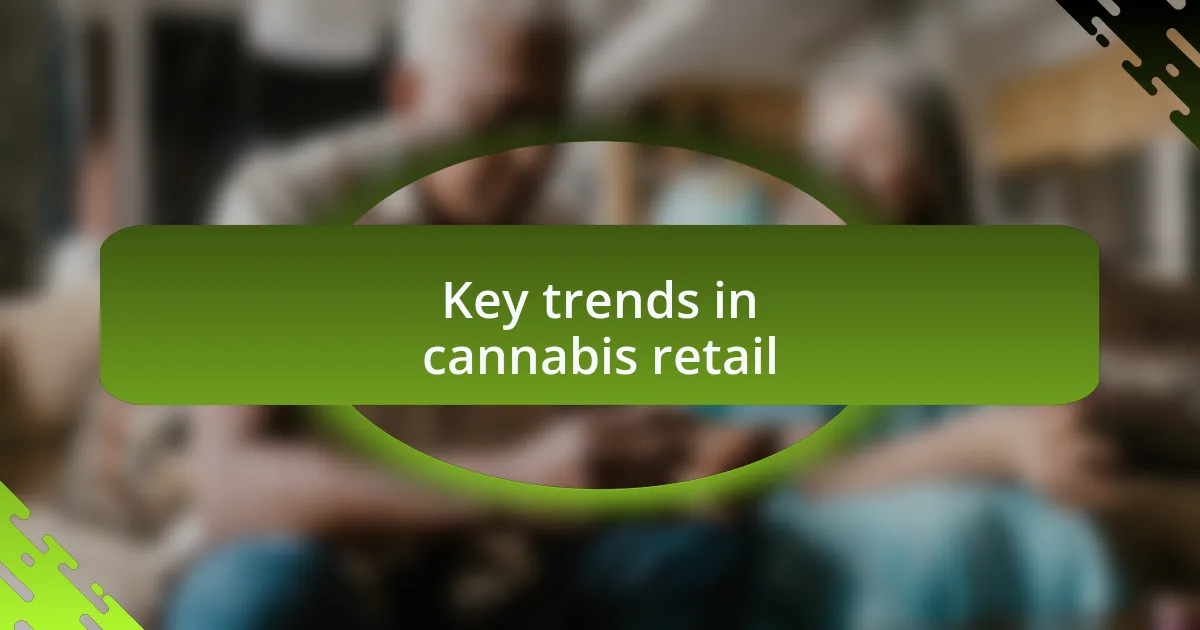Key takeaways:
- Cannabis retail has evolved from an underground market to a regulated sector, emphasizing local preferences and personalized customer experiences.
- Regional sales significantly influence customer loyalty and market strategies, with successful dispensaries adapting their offerings to community tastes.
- Key trends include personalization, digital engagement, and sustainability, which enhance trust and connection between retailers and customers.
- Challenges such as regulatory hurdles, knowledge disparities, and market competition necessitate retailers to invest in education and relationship-building strategies.

What is cannabis retail
Cannabis retail refers to the sale of cannabis products, both recreational and medicinal, directly to consumers through licensed dispensaries. I’ve always found it fascinating how this industry has evolved, transforming from a largely underground market to a legitimate sector with clear regulations. Have you ever thought about how this shift has affected local economies?
Every dispensary is unique, often tailored to the preferences of their local clientele. I recall visiting a shop that focused exclusively on organic grow methods; the atmosphere felt more like a wellness center than a traditional store. This personalization speaks volumes about how retailers adapt to their community’s needs and values.
In the world of cannabis retail, education is crucial. As I’ve explored various shops, I’ve noticed that the best retailers take the time to inform their customers about different strains and consumption methods. Isn’t it empowering to make informed choices when you visit a store, instead of just wandering in blindly? This commitment to knowledge-sharing not only builds trust but also fosters a deeper connection between the retailer and the community.

Importance of regional sales
The significance of regional sales in the cannabis sector cannot be understated. I’ve noticed that local preferences heavily influence purchasing behavior, making it essential for dispensaries to understand their community’s unique tastes. For instance, a shop in a health-conscious area might focus on CBD products, while another in a more recreational market might prioritize edibles. Have you ever considered how these choices impact sales strategies?
Moreover, regional sales drive customer loyalty. During my visits, I’ve frequently seen the same faces return to their local dispensary, forming connections with staff who remember their names and preferences. This relationship fosters a sense of belonging, creating a customer base that feels more like a community. Isn’t it remarkable how such personal interactions can enhance a business’s success?
In looking at broader trends, regional sales help identify market opportunities that can be easily overlooked in a national context. For example, I once attended a local cannabis expo where I learned about niche products gaining traction in specific areas. This kind of insight is invaluable for retailers aiming to stay ahead of the curve, allowing them to adjust their inventory based on actual consumer demand in their region. How often do we see businesses thrive by simply listening to their customers?

Key trends in cannabis retail
The cannabis retail landscape is rapidly evolving, and one key trend I’ve noticed is the shift towards personalization in product offerings. Dispensaries are increasingly tailoring their selections based on local preferences, which can create a unique shopping experience. I remember visiting a dispensary that specialized in artisanal cannabis-infused beverages, catering to a community that values craft and quality. This attention to local tastes differentiates retailers from competitors and builds stronger customer loyalty.
Another important trend is the rise of digital engagement. More dispensaries have started using social media not just for promotions but also to educate customers about products and their benefits. I found it fascinating how one shop integrated live Q&A sessions on Instagram, allowing customers to interact directly with knowledgeable staff. Have you ever thought about how this builds trust? It creates a dynamic dialogue between the store and its customers, enhancing the sense of community further.
Lastly, sustainability is becoming a prominent focus among cannabis retailers. Many businesses are adopting eco-friendly practices, such as sourcing organic products and utilizing sustainable packaging. Personally, I was drawn to a local dispensary that showcased its commitment to the environment through transparent practices and community clean-up events. This not only attracts environmentally conscious consumers, but it also sets a positive tone for the industry as a whole—don’t you agree that such initiatives reflect a brand’s values beyond just making a sale?

Challenges in regional sales
It’s intriguing to observe how regulatory hurdles can significantly impact regional sales in the cannabis market. For instance, when I visited a dispensary in a state with stricter regulations, the owners expressed frustration over compliance costs. They shared stories of how navigating local laws often diverted their focus from customer service to legal paperwork. It makes you wonder—how many potential sales are lost due to such bureaucracy?
Another challenge I’ve seen is the disparity in consumer knowledge across regions. In one city, I encountered customers who were well-informed about strains and terpenes, while in a nearby area, many shoppers were still unfamiliar with basic cannabis terms. This gap can create a disconnect, making it crucial for retailers to invest in education initiatives. Have you ever experienced that moment when you felt lost in a product selection? It can be discouraging, not just for consumers but for retailers striving to connect meaningfully with their audience.
Lastly, competition among retailers poses a persistent challenge. I remember sitting with a dispensary manager who expressed concern about saturation in their market. Despite their unique offerings, they felt pressured to constantly innovate to keep customers engaged. With so many options available, retaining customer loyalty becomes a daunting task. It really makes you think—what truly makes a customer choose one store over another in such a bustling market?

My experiences with local markets
Visiting local markets has often given me a front-row seat to the unique personality of each community. I recall a trip to a small-town dispensary where the owners knew almost every customer by name. It felt like stepping into a cozy local café, where personal relationships transformed a simple transaction into a warm exchange. Have you ever experienced an environment where you felt valued as more than just a customer? Those interactions make a lasting impression, building loyalty in a way that advertising simply can’t.
In contrast, there was a bustling urban market I explored, filled with sleek stores and high-tech displays. Walking through those aisles, I noticed that while the atmosphere was vibrant, it lacked the personal touch I had experienced in smaller markets. It left me wondering if the overwhelming ambiance fostered excitement or simply alienation. Isn’t it interesting how the same product can feel so different based on the context in which it’s sold?
Then, there are the seasonal variations I’ve observed. During local festivals or holidays, certain dispensaries thrived, leveraging community spirit and festive vibes. I remember a dispensary that hosted an open-house event during a harvest festival. Their approach not only brought in new faces but created a sense of belonging—an invitation to be part of something bigger. It’s these moments that highlight the importance of local engagement in building brand loyalty. Have you thought about the potential of community events in transforming a business? I certainly have.

Strategies for successful sales
Sales strategies in the cannabis retail space should prioritize building meaningful relationships. I remember a time at a regional dispensary that implemented a customer loyalty program; they not only rewarded purchases but also acknowledged anniversaries and special occasions. This personal touch made customers feel appreciated, encouraging repeat visits. Have you ever noticed how small gestures can turn an ordinary transaction into a memorable experience?
Another successful strategy involves creating a strong online presence that complements the physical store. During the pandemic, I saw dispensaries thrive by enhancing their website and social media engagement. They shared educational content about cannabis products and actively interacted with customers online. This dual approach not only attracted new customers but also kept existing ones informed and involved. Don’t you think that an informed customer is more likely to make a purchase?
Additionally, hosting educational workshops can serve as an excellent strategy for driving sales. I visited a dispensary that offered free classes on different strains and their effects. Not only did this establish them as a knowledgeable resource, but it also fostered a sense of community among participants. I left that seminar feeling equipped with information and connected to fellow enthusiasts. Isn’t it fascinating how knowledge can empower customers to engage more deeply with a brand?